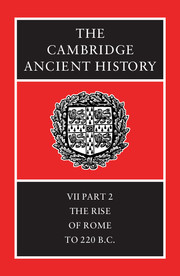Book contents
- Frontmatter
- 1 The Sources for Early Roman History
- 2 Archaic Rome Between Latium and Etruria
- 3 The origins of Rome
- 4 Rome in the fifth century I: the social and economic framework
- 5 Rome in the fifth century II: the citizen community
- 6 Rome and Latium to 390 B.C.
- 7 The recovery of Rome
- 8 The conquest of Italy
- 9 Rome and Italy in the early third century
- 10 Pyrrhus
- 11 Carthage and Rome
- 12 Religion in Republican Rome
- Appendix
- Chronological Table
- BIBLIOGRAPHY
- Index
- Fig. 50:The city of Rome in the early third century b.c.
- Map 11: The western Mediterranean in the third century
- References
5 - Rome in the fifth century II: the citizen community
Published online by Cambridge University Press: 28 March 2008
- Frontmatter
- 1 The Sources for Early Roman History
- 2 Archaic Rome Between Latium and Etruria
- 3 The origins of Rome
- 4 Rome in the fifth century I: the social and economic framework
- 5 Rome in the fifth century II: the citizen community
- 6 Rome and Latium to 390 B.C.
- 7 The recovery of Rome
- 8 The conquest of Italy
- 9 Rome and Italy in the early third century
- 10 Pyrrhus
- 11 Carthage and Rome
- 12 Religion in Republican Rome
- Appendix
- Chronological Table
- BIBLIOGRAPHY
- Index
- Fig. 50:The city of Rome in the early third century b.c.
- Map 11: The western Mediterranean in the third century
- References
Summary
POLITICAL AND CONSTITUTIONAL DEVELOPMENTS
(a) The ancient account
The literary sources present a broadly uniform picture of the constitutional developments of the early Republic. In c. 509 B.C. the forcible seduction of Lucretia (wife of L. Tarquinius Collatinus) by Tarquinius Superbus’ son Sextus and her subsequent suicide prompted a revolution, led by L. Iunius Brutus. Superbus was driven from Rome and an already well-established hereditary aristocracy, the patriciate, assumed control of the state, monopolizing political office. From the first the secular powers of the kings were vested in two magistrates, later known as consuls but at first as praetors, who were elected by the people and held office for one year. They did not, however, inherit the king's sacral powers, although they had the right and duty on prescribed occasions to ascertain the will of the gods by ‘taking the auspices’. Some of the king's sacrificial duties were committed to a newly established rex sacrorum, a priest holding office for life, but control of religious practices is, later at least, found in the hands of the pontifex maximus.
The consuls commanded Rome's armies and exercised civil (and potentially at least criminal) jurisdiction. They also presided over the senate and assemblies and in general acted as the chief executives of the state. Originally they took the census but this function was transferred in 443 B.C. to two censors elected at intervals, who also at some stage acquired from the consuls the duty of compiling the list of senators. If both consuls were absent from Rome they would appoint a prefect of the city to see to its protection and any necessary domestic administration. They were also assisted by two junior magistrates called quaestors (raised to four in 421 B.C.) who were charged chiefly with financial duties.
Keywords
- Type
- Chapter
- Information
- The Cambridge Ancient History , pp. 172 - 242Publisher: Cambridge University PressPrint publication year: 1990
References
- 5
- Cited by



